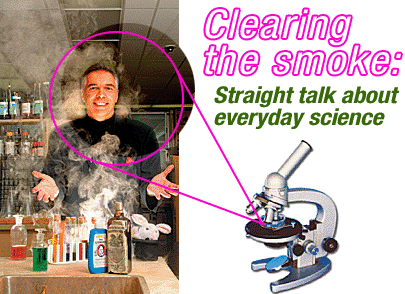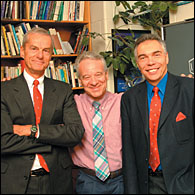Clearing the Smoke: Straight Talk About Everyday Science
Clearing the Smoke: Straight Talk About Everyday Science McGill University
User Tools (skip):
Clearing the Smoke: Straight Talk About Everyday Science

Joe Schwarcz and his colleagues at McGill's Office for Chemistry and Society have found the formula for success. By giving people what they want - -- jargon-free science information -- they're drawing accolades and blazing a trail in public education.
Joe Schwarcz and David Harpp stood in the lecture hall as students streamed into class. One backpack-laden young man separated himself from the pack, pointed his finger in Schwarcz's face, and announced, "The Discovery Channel man of my youth -- I love you!"He then disappeared into the crowd.
Harpp, former chair of the Department of Chemistry, tells this story to illustrate a couple of points. First, "Joe is probably the best known chemistry person in the country -- people don't know Nobel prize winners, but they know who is on TV." And that's good for McGill, he stresses. "Students see someone they know and admire -- and they think, 'I'm at the right place!'"
Schwarcz, Harpp and Ariel Fenster make up McGill's Terrific Trio of popular chemistry; more prosaically, they form the Office for Chemistry and Society (OCS), housed in a room on the ground floor of the Otto Maass Building overflowing with books and curios. The OCS mandate: bringing chemistry, or at least accurate information about it, to the people.
|
|
 From left: David
Harpp, Ariel Fenster and Joe Schwarcz in the Office for Chemistry and
Society From left: David
Harpp, Ariel Fenster and Joe Schwarcz in the Office for Chemistry and
Society
|
|
|
|
"Professors have a responsibility to talk to people about science," insists Schwarcz, the director of the OCS. While his motivations are many, he points to the erroneous information that frequently finds its way into the popular media -- especially, these days, through the Internet, which he calls "a boon for quacks." Much of his energy goes into debunking popular fads designed to exploit people's ignorance: about diets, medication and chemical applications in general.
"I get frustrated by academics who dismiss writing for regular people, who say, 'You don't need to know that' or 'You wouldn't understand that.' Universities are paid for by these people -- it's our responsibility to help them to understand," he says. And they want to understand, he adds. "People are thirsting for information."
If recent history is any evidence, people are slaking that thirst by turning to Schwarcz and the OCS. Schwarcz, Harpp and Fenster -- before the advent of the OCS -- organized a 1995 presentation at Bell Expotec, in Montreal's old port, which 370,000 people elbowed their way through. The OCS regularly organizes smaller-scale presentations designed and usually performed by one of the team members. During an interview for this article, Schwarcz fielded a phone call to arrange a presentation -- catchily titled "Sense, Nonsense and Science" -- for a professional association in search of an entertaining and informative speaker.


